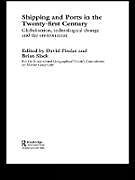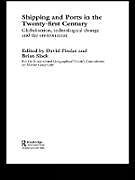Shipping and Ports in the Twenty-first Century
Einband:
Fester Einband
EAN:
9780415283441
Untertitel:
Globalization, Technological Change and the Environment
Genre:
Branchen
Autor:
David Slack, Brian Pinder
Herausgeber:
Taylor and Francis
Auflage:
1. Auflage
Anzahl Seiten:
304
Erscheinungsdatum:
20.05.2004
ISBN:
978-0-415-28344-1
Informationen zum Autor David Pinder is Emeritus Professor of Geography, University of Plymouth, UK. He is also Foreign Member, Royal Dutch Academy of Arts and Sciences. Brian Slack is Professor of Geography, Concordia University, Montreal, Canada. Klappentext The rapid change of pace in the global economy and the importance of understanding the roles played by port and shipping systems in both enabling and responding to this economic dynamism provides the rationale for this work. Zusammenfassung Shipping and port systems are vital to societies and lifestyles around the world. In the late twentieth century, however, assumptions concerning the robustness of these systems were severely shaken by economic shocks triggered by oil crises. This volume explores how many of the consequent uncertainties have been resolved, and how adapted systems have been shaped to meet the challenges of the new millennium. To explore these issues, contributors focus on issues such as: · economic integration of emerging economies - in particular China · sectors as diverse as the high-speed ferry and offshore oil industries · pollution problems generated by shipping Contributors' investigations, such as those into the homogenisation of the container industry and the port cluster concept and 'model' vessels for the offshore oil industry, make for a rewarding book that will be of interest to academics working in many fields including transport studies, marine and coastal studies and economic geography. Professional organizations and policy-makers will also appreciate the book. Inhaltsverzeichnis 1. Contemporary Contexts for Shipping and Ports Part 1: Global and Local in the Maritime Sector 2. Corporate Realignment and the Global Imperatives of Container Shipping 3. China's Competitive Push for Global Trade: Port Sytem Development and the Role of the COSCO 4. Appropriate Models of Port Governance: Lessons from the Port Authority of New York and New Jersey 5. Analysing the Performance of Seaport Clusters 6. Ocean Cruising: Market Dynamics! Product Responses and Onshore Impacts Part 2: Technology the Enabler 7. From 'Anyport' to 'Superterminal': Conceptual Perspectives on Containerisation and Port Infrastructure 8. High Speed at Sea: Evolution and Issues 9. Energy from the Deep: Vessels! Technologies and Issues Part 3: The Environment - Towards a New Harmony? 10. Integrated Environmental Management of Ports and Harbours: The European Experience from Policy to Practice 11. Port Development and Implementation Challenges in Environmental Management: The Case of Venice 12. Operational Pollution from Shipping: Sources! Environmental Impact and Gobal Contribution 13. Trade and Envrionmental Management in the Straits of Malacca: The Singapore Experience Index ...
Autorentext
David Pinder is Emeritus Professor of Geography, University of Plymouth, UK. He is also Foreign Member, Royal Dutch Academy of Arts and Sciences.
Brian Slack is Professor of Geography, Concordia University, Montreal, Canada.
Klappentext
The rapid change of pace in the global economy and the importance of understanding the roles played by port and shipping systems in both enabling and responding to this economic dynamism provides the rationale for this work.
Zusammenfassung
Shipping and port systems are vital to societies and lifestyles around the world. In the late twentieth century, however, assumptions concerning the robustness of these systems were severely shaken by economic shocks triggered by oil crises.
This volume explores how many of the consequent uncertainties have been resolved, and how adapted systems have been shaped to meet the challenges of the new millennium. To explore these issues, contributors focus on issues such as:
· economic integration of emerging economies - in particular China
· sectors as diverse as the high-speed ferry and offshore oil industries
· pollution problems generated by shipping
Contributors' investigations, such as those into the homogenisation of the container industry and the port cluster concept and 'model' vessels for the offshore oil industry, make for a rewarding book that will be of interest to academics working in many fields including transport studies, marine and coastal studies and economic geography. Professional organizations and policy-makers will also appreciate the book.
Inhalt
1. Contemporary Contexts for Shipping and Ports Part 1: Global and Local in the Maritime Sector 2. Corporate Realignment and the Global Imperatives of Container Shipping 3. China's Competitive Push for Global Trade: Port Sytem Development and the Role of the COSCO 4. Appropriate Models of Port Governance: Lessons from the Port Authority of New York and New Jersey 5. Analysing the Performance of Seaport Clusters 6. Ocean Cruising: Market Dynamics, Product Responses and Onshore Impacts Part 2: Technology the Enabler 7. From 'Anyport' to 'Superterminal': Conceptual Perspectives on Containerisation and Port Infrastructure 8. High Speed at Sea: Evolution and Issues 9. Energy from the Deep: Vessels, Technologies and Issues Part 3: The Environment - Towards a New Harmony? 10. Integrated Environmental Management of Ports and Harbours: The European Experience from Policy to Practice 11. Port Development and Implementation Challenges in Environmental Management: The Case of Venice 12. Operational Pollution from Shipping: Sources, Environmental Impact and Gobal Contribution 13. Trade and Envrionmental Management in the Straits of Malacca: The Singapore Experience Index

Leider konnten wir für diesen Artikel keine Preise ermitteln ...
billigbuch.ch sucht jetzt für Sie die besten Angebote ...
Die aktuellen Verkaufspreise von 6 Onlineshops werden in Realtime abgefragt.
Sie können das gewünschte Produkt anschliessend direkt beim Anbieter Ihrer Wahl bestellen.
Loading...
Die aktuellen Verkaufspreise von 6 Onlineshops werden in Realtime abgefragt.
Sie können das gewünschte Produkt anschliessend direkt beim Anbieter Ihrer Wahl bestellen.
| # | Onlineshop | Preis CHF | Versand CHF | Total CHF | ||
|---|---|---|---|---|---|---|
| 1 | Seller | 0.00 | 0.00 | 0.00 |
